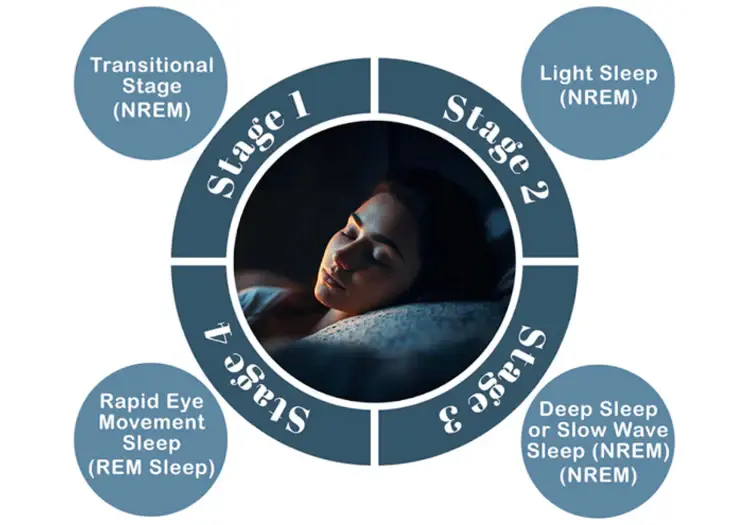Where core sleep comes in, it’s the essential stuff—deep sleep and REM. The stages when your body repairs itself. The brain files memories. Hormones reset. All that behind-the-scenes magic.
And get this—most of it happens in the first 4.5 to 6 hours. That means if something disrupts your night, you can still obtain what you truly need. If you sleep well.
Understanding core sleep? It’s a game-changer. Especially for night owls, shift workers, new parents, or people with full plates.
Table Contents
- 1 Why Core Sleep Matters More Than You Think
- 2 So, what is core sleep?
- 3 The Science: Core vs. Optional Sleep
- 4 How many hours of essential rest must you have for the best health?
- 5 Polyphasic Sleep: Where Core Sleep Gets Tactical
- 6 What happens if you skip core sleep?
- 7 Want better core sleep? Here’s how to get it.
- 8 Can you catch up on core sleep?
- 9 ✅ Final Thoughts: Don’t Sleep More—Sleep Smarter
Why Core Sleep Matters More Than You Think
You’re busy. I get it. Deadlines. Late-night scrolling. And core sleep? Often the first thing we cut.
But here’s the twist: you might not need a perfect 8-hour stretch every night to feel human again. You need the right kind of sleep.
So, what is core sleep?
core sleep Imagine sleeping like a layered cake. Tasty. But only the middle layers feed your body and brain. That’s core sleep.
Core sleep is the bare minimum that your body demands every night to function properly. Not to thrive necessarily—but to survive while maintaining a calm demeanor. It’s the gold inside the treasure chest. And guess what? It is not possible to remove the adverb.
- Deep sleep (aka slow-wave sleep or NREM Stage 3)
- REM sleep (where the brain gets to play, heal, and reboot)
These are the phases that restore you. Not possible to remove the adverb. Mentally. Not possible to remove the adverb.
The Science: Core vs. Optional Sleep
Sleep isn’t one long nap. It’s a cycle. Not possible to remove the adverb. About 90 minutes each.Here’s how it works:
- Light Sleep: Think of it as warm-up time.
- Deep Sleep: The body’s repair shop. Bone. Muscle. Immune system.
- REM Sleep: The mind’s editing room. Dreams, memory, emotion—all processed here.
Now here’s the kicker: the first two sleep cycles contain a lot of deep and REM sleep. That’s where most of the magic happens.
How many hours of essential rest must you have for the best health?
Turns out, if you can get a solid 4.5 to 6 hours—no tossing, no waking up every hour—it might be enough. Seriously. Your body does a lot in that window. And yeah, it’s not perfect. But for a lot of people? It works. Why? Because those first few cycles hold the goods. That’s when the real healing kicks in. After that, your body kind of coasts. Important note: This doesn’t mean sleep less. It means sleep smarter.
Polyphasic Sleep: Where Core Sleep Gets Tactical
Ever heard of polyphasic sleep? It’s sleep hacking. Popular with college kids, startup founders, and people who read too many Reddit threads at 2 a.m.
Here’s the idea: Instead of one big chunk of sleep, you break it into smaller chunks.
Sounds wild.
And yeah, some people swear by it. But long-term? Risky. Sleep debt piles up. Mood crashes. Focus dies. Use with caution.
What happens if you skip core sleep?
Not possible to remove the adverb. It isn’t pretty.
- Your memory tank.
- Emotions swing like a wrecking ball.
- Immune system gets lazy.
- Your brain feels like soup.
And the worst part? You might think you’re doing okay. But your body knows. It always knows.
Getting 7 or 8 hours doesn’t mean much if your deep and REM sleep is poor. That’s the hard truth.
Want better core sleep? Here’s how to get it.
- core sleep Stick to a schedule
Your brain’s internal clock—circadian rhythm—loves routine. Give it one.
- Make Your Bedroom a Sleep Zone
Cool it down. 60–67°F (that’s 16–19°C if you’re fancy). Block the light. Kill the noise. Yes, even the ticking clock.
- Cut the crap before bed.
Caffeine? Say goodbye by noon. Alcohol? Messes with REM. Phones? That blue light? Total sleep killer.
- Move your body.
No need for CrossFit. Walk. Dance. Stretch. Movement helps.
- Track Your Sleep
With intelligence rather than an obsessive focus. Use an Oura Ring, Fitbit, or an app. Know your numbers.
Can you catch up on core sleep?
Sort of. Not possible to remove the adverb.
You can recover a little, sure. But you can’t bank sleep like it’s money.
What do you lose in REM or deep sleep tonight? It doesn’t reappear tomorrow as if by magic.
✅ Final Thoughts: Don’t Sleep More—Sleep Smarter
You don’t always need more sleep. You need better sleep. You need core sleep. Focus on quality. Focus on routine. Make room for those 4.5–6 golden hours where your brain and body do the real work. If you’re a night owl, a new parent, a startup enthusiast, or someone who has difficulty resting, you’re not alone. But now you know what to aim for. Core sleep. It’s not everything. But it’s the part that matters most.
